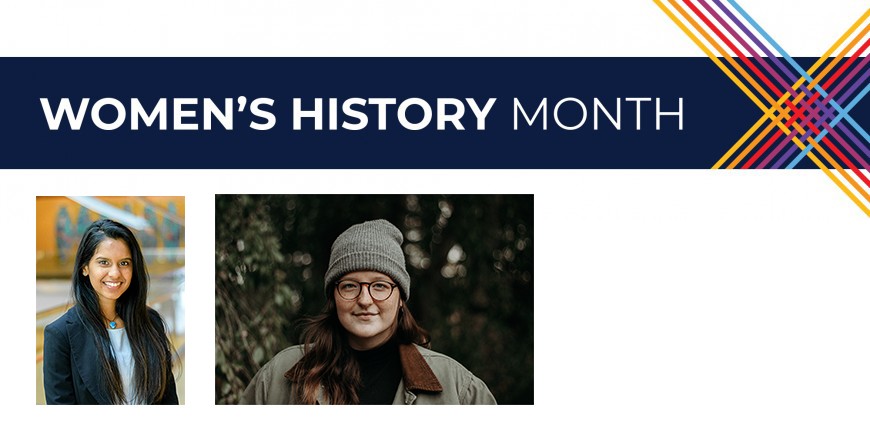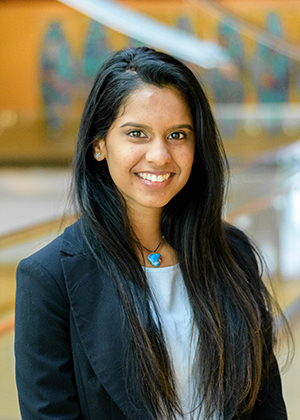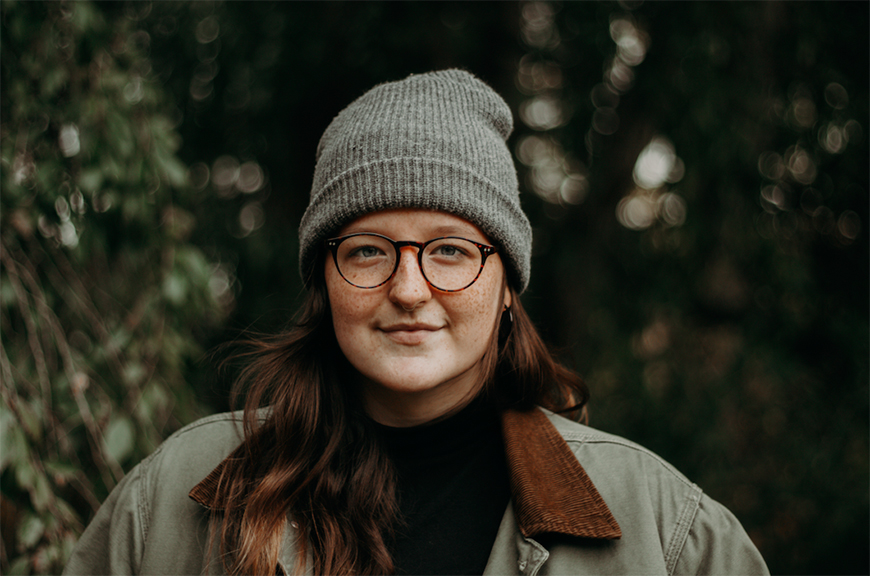
 back to all news
back to all news
Women's History Month: Voices of PitE Students

In celebration of Women’s History Month, we asked two undergraduate students in the Program in the Environment (PitE) to share their insights—and experiences—as young women at U-M. They are among the generation that will contribute to the “next chapter” of women’s history, and we greatly appreciate the perspectives of Hannah Kuriakose and Bridgette Pollaski.
We also invite you to explore more of our series, Women’s History Month: Perspectives from SEAS Women in Sustainability.
- Voices of Faculty
- Voices of Master’s Students
- Voices of Alumnae
- Nancy Arkin MLA: Open to Opportunities
- Professor Joan Nassauer: Much remains to be done
- A Snapshot of Women Faculty, 1972/2022

Hannah Kuriakose
Senior Research Assistant & Project Case Manager, U-M Institute for Social Research
BA Class of '21 | International Studies | Environmental Law, Policy and Justice
Hannah Kuriakose is a final-year undergraduate student pursuing a double-major in International Studies (Security, Norms, and Cooperation) and Environmental Law, Policy, and Justice, with a Minor in Writing. Her interests lay at the intersection of international human rights, environmental justice, foreign diplomacy, and public service. Hannah intends to pursue further studies in Law school, focusing on International Human Rights and Environmental Law.
What inspired your interest in PitE?
Piqued by my interest in foreign policy and human rights, I began as solely an International Studies major. I happened to stumble upon the PitE table at the Major/Minor Expo in March of 2019 where I learned about the expansive nature provided by the PitE program, where I additionally unraveled my latent interests in sustainability and realized that it indeed revolves around interdisciplinary and intersectional work. I was intrigued by the law and policy specialization offered through PitE and set up an advising appointment for the next day. I pored over the course lists and professors within the program and felt a level of excitement I hadn't before when I realized how I would be able to merge my now two majors of International Studies (Security, Norms, Cooperation) and Environmental Law, Policy, and Justice to pursue my larger, personal drive to work towards international and environmental human rights.
Do you feel that women bring unique perspectives to the sustainability fields? If so, what are those perspectives, and why are they important?
Absolutely. Studies conducted across the world -- like in Sweden, Japan, and the United States -- have shown that women are more environmentally conscious regarding their consumption habits, energy usages, and recycling/reusing mechanisms. OECD studies have shown that women in developed countries now make up for 80% of household purchases, and have led large corporations, like Kimberly Clark, Unilever, and Johnson & Johnson to strategize eco-friendly means of production. As mentioned, I have spent my undergraduate years pursuing the intersection of my majors, and have largely focused on nuclear nonproliferation and disarmament as one of my primary areas of focus. In learning about this topic, as just one example, I have realized that, biologically, women experience environmental hazards differently and so naturally, bring about equally important dialogue to the center of sustainability. Women often receive the brunt of the consequences of environmental degradation across the world, especially in lower-income countries and regions, simply due to social hierarchies. Because of this, women inherently experience the environment in different ways, and thus, naturally have unique perspectives to offer expansively in the field of sustainability.
As a woman, do you feel that you have had to overcome any gender barriers in your education—or in the goals that you pursue?
Again, absolutely. I think both the PICS and PitE departments are well-populated with strong women who are driven by passion in their respective areas, but as someone who has quite an interdisciplinary background and has had to take a range of courses within the humanities, social sciences, policy, etc., I did find myself in courses and discussions where I was one of just a handful of women in a full class of men. Although most people did not intentionally try to diminish my/our voices during discussions, I/we were often overpowered and conditioned to believe we didn't have as much to say as those who were consistently and unapologetically vocal. As I entered the smaller, more upper-level courses in these programs, though, I did find there to be a good representation of women, whose voices were equally heard.
In my practical work through internships, jobs, and seeking out post-graduation job opportunities, I have found a frustrating system of inequitable representation of women. As a farm intern during one of my summer internships, I was one of two women working on the farm. I have been privileged to find young women mentorship programs where women who have worked in a respective field spend time with us mentees to share how to grow and encourage perseverance, but I have also seen the systematic issues regarding working one's way up in a given career (ex. like in foreign diplomacy, etc.). I have spoken to mentors who have worked within foreign policy, international affairs and journalism, and like fields, who have shared their struggles in having an equal say at the decision-making table. This is so reflective of the smaller-scale classrooms that teach these topics, and is something I am more cognizant of now and do hope will not serve as a deterrent for me and other women entering this field.
What are your career interests after earning your degree?
I am currently job-hunting and hope to find opportunities where I can utilize my academic background, writing minor skills, and personal interests to work as a program coordinator, project/research/policy assistant, or something of the sort for a year or two. I do intend on going to law school after working for my gap year (or two) to pursue a focus in international and environmental law. My interests post-law school seem broad, but they all relate to the realm of foreign diplomacy or something where I can merge sustainability into domestic and international human rights and synergistically mesh top-down decision-making processes with grassroots passion and advocacy.

Bridgette Pollaski
Environmental Assistant Intern, Washtenaw County Water Resources Commissioner's Office
President, Program in the Environment Club
BA Class of '21 | PitE, Waste Theory & the Circular Economy
Bridgette Pollaski is a first-generation senior at the University of Michigan. Her passions lie within both social and environmental sustainability, with specific interests in waste, the circular economy, second-hand markets, sustainable cities, combating food insecurity, advocacy, and support of non-traditional identities entering and shaping professional spaces.
What inspired your interest in PitE?
I was inspired to major in PitE after learning about the science of climate change in an intro environment class. Climate change, and broader environmentalism, felt like the defining issue of our time, and that naturally drew me into the major.
Do you feel that women bring unique perspectives to the sustainability fields? If so, what are those perspectives, and why are they important?
I feel as if women bring an extra layer of attention and care to this field. Women are often more socialized to take up nurturing behaviors, and this translates well to wanting to protect the environment.
As a woman, do you feel that you have had to overcome any gender barriers in your education—or in the goals that you pursue?
My current academic interests lie in all things “waste.” Often, my work involves situations where I am getting dirty: in a dumpster, collecting hazardous waste, or sorting through compost. I think that there is already a negative association with waste and these actions, but being a woman almost makes it more taboo to get dirty. Additionally, I think it’s important to add that some of my other identities, such as being first-generation and low income, also impact how I navigate this field and often intersect with my female identity. I find myself caring deeply about the work that I do while also having to work harder than those around me to be at the same level. My socialization as a woman pushes me to take on the burden of others and perform in leadership roles, and being the first to go to college while being poor has forced me to play catch-up with my peers and work multiple jobs while also doing school. My identities are not separate from each other.
What are your career interests after earning your degree?
As for my career plans, I have no idea! I am going where the wind takes me, lol. My current career interests are in tackling food insecurity and providing mutual aid, but I’m also interested in waste management consulting and urban planning.
The Program in the Environment (PitE) offers both a broad liberal arts education in environmental topics and the opportunity for students to pursue various lines of individual interest in considerable depth. Broadly speaking, PitE’s curriculum focuses on the complex interactions of human beings and their environment. To understand these interactions and learn how to create more rational and equitable forms of human habitation on this planet, PitE students develop a multidisciplinary perspective integrating the methods and approaches of the natural sciences, social sciences, and humanities.

